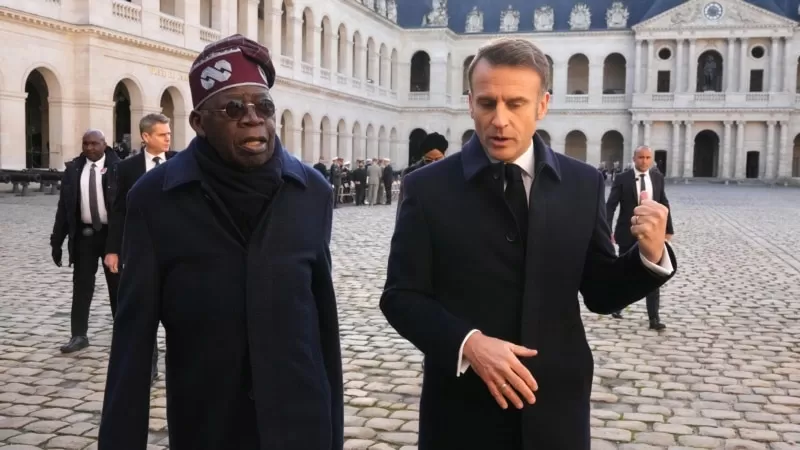ABUJA, NIGERIA — Nigeria’s recent series of agreements with France during President Bola Tinubu’s three-day visit to the European country has sparked both praise and caution from political analysts.
The visit, which marked the first official state visit to Paris by a Nigerian leader in over two decades, resulted in two major deals being signed between the two nations. The first, a $300 million pact, aims to develop critical infrastructure, renewable energy, transportation, agriculture, and healthcare in Nigeria. The second agreement focuses on increasing food security and developing Nigeria’s solid minerals sector.
President Tinubu’s efforts to attract investments to boost Nigeria’s struggling economy have been met with praise for these latest deals with France. However, some critics are urging caution, citing France’s strained relationships with Sahelian states following a series of military coups in the region.
Political affairs analyst Ahmed Buhari expressed his concerns about the partnership, stating, “Everybody is trying to look for a new development partner that would seemingly be working in their own interest, but obviously we don’t seem to be on the same page. We’re partnering with France, who has been responsible for countries like Chad, Niger, Mali, Burkina Faso, and the likes, and we haven’t seen significant developments in those places in the last 100 years.”
However, Abuja-based political analyst Chris Kwaja believes that France’s strained relationships with Sahelian states should not affect its relationship with Nigeria. He stated, “That the countries of the Sahel have a fractured relationship with France does not in any way define the future of the Nigeria-France relationship. No country wants to operate as an island. Every country is looking at strategic partnerships and relationships.”
France has a long history of involvement in the Sahel region, including military intervention, economic cooperation, and development aid. However, critics argue that the countries associated with France have been grappling with poverty and insecurity.
Eze Onyekpere, an economist and founder of the Center for Social Justice, emphasized the need for caution before signing any deals with France. He stated, “It is a little bit disappointing considering the reputation of France in the way they’ve been exploiting minerals across the Sahel. They’ve been undertaking exploitation in a way and manner that’s not in the best interest of those countries. I hope we have good enough checks to make sure that the agreements signed will generally be in the interest of both countries and not a one-sided agreement.”
Despite these concerns, Nigeria remains France’s top trading partner in sub-Saharan Africa. The recent visit also saw two Nigerian banks, Zenith and United Bank for Africa, signing agreements to expand their operations into France.
As Nigeria continues to navigate its economic challenges, strategic partnerships and relationships with other countries are crucial. The agreements signed with France have the potential to bring much-needed development and growth to Nigeria’s economy. However, it is essential to ensure that these deals are mutually beneficial and not one-sided.
President Tinubu’s visit to France and the resulting agreements demonstrate Nigeria’s commitment to strengthening its ties with other nations and attracting investments. It also highlights the country’s potential for growth and development, which can be achieved through strategic partnerships and collaborations.
In conclusion, while some may express caution, it is crucial to approach these agreements with optimism and a positive outlook. With proper checks and balances in place, the partnership between Nigeria and France has the potential to bring about significant progress and development for both nations. Let us look forward to a fruitful and mutually beneficial relationship between these two countries.


